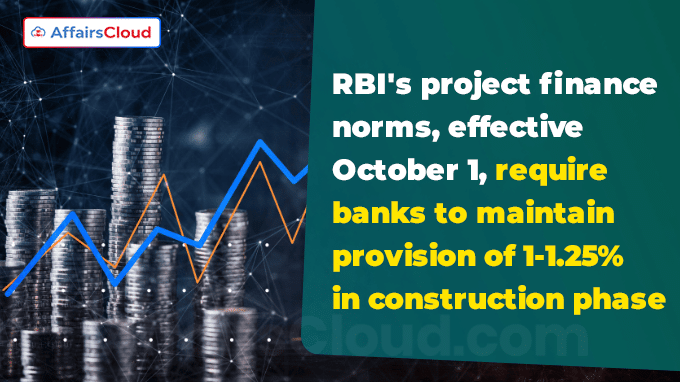 In June 2025, the Reserve Bank of India (RBI) introduced the ‘RBI (Project Finance) Directions, 2025’, applicable to banks, Non-Banking Financial Companies (NBFCs), cooperative banks, and all other regulated entities. These directions, set to come into effect from 1 October 2025, are aimed at enhancing the flow of credit to project finance while ensuring financial prudence and a uniform regulatory framework across lending institutions.
In June 2025, the Reserve Bank of India (RBI) introduced the ‘RBI (Project Finance) Directions, 2025’, applicable to banks, Non-Banking Financial Companies (NBFCs), cooperative banks, and all other regulated entities. These directions, set to come into effect from 1 October 2025, are aimed at enhancing the flow of credit to project finance while ensuring financial prudence and a uniform regulatory framework across lending institutions.
- This eased regulation for project financing will make it less expensive for lenders to provide loans for infrastructure and industrial projects like roads, ports and power plants.
- The RBI had issued draft guidelines on ‘Prudential Framework for Income Recognition, Asset Classification and Provisioning pertaining to Advances – Projects Under Implementation’ in May 2024. After examining the inputs/feedback received on the draft, this final direction was formalised and released.
Key Highlights:
i.The RBI issued the final guidelines on project finance norms, mandating lenders to maintain a general provision of 1.25% on Commercial Real Estate (CRE) exposures.
- And 1% each on Commercial Real Estate-Residential Housing (CRE-RH) and other portfolios during the construction phase.
ii.Banks shall have to maintain 1% general provisions on CRE projects during the operational phase after commencement of repayment of interest and principal, and 0.75% on CRE-RH, while 0.40% on all other projects.
iii.Banks are required to maintain additional provisioning for loans where the commencement of commercial operations is delayed beyond the originally scheduled date.
- For such delays, banks must provide an extra 0.375% per quarter for infrastructure projects
- In the case of non-infrastructure projects, including CRE and CRE-RH, the additional provision is higher, set at 0.5625% per quarter.
iv.The directions mandate the adoption of a principle-based approach for resolving stress in project finance exposures, ensuring consistency and harmonisation across all regulated entities (REs).
- The permissible extensions for the Date of Commencement of Commercial Operations’ (DCCO) have been revised, with an overall ceiling of 3 years for infrastructure projects and 2 years for non-infrastructure projects (including CRE and CRE-RH).
- This provides the flexibility to REs in extending the DCCO within the above ceilings.
v.The provisions in the final directions are sharply lower than what was proposed in the draft norms. In the draft norms, it was proposed that banks set aside a provision of:
- 5% of the loan amount during construction phase
- 2.5% during operational phase
- 1% after the project starts generating cash sufficient to cover lenders repayment.
vi.Loans that are disbursed and achieve financial closure prior to 1 October 2025 will be exempt from the new norms and will continue to be governed by the existing guidelines.
Note: New Delhi(Delhi) based Power Finance Corporation Limited (PFC) and Rural Electrification Corporation Limited (REC) which together hold more than Rs 16 lakh crore in project loans, were highlighted as among the most exposed to these draft norms.
About Reserve Bank of India (RBI):
i.The RBI is the sole authority to issue currency notes in India, except for the Rs 1 note, which is issued by the Ministry of Finance (MoF). It issues currency notes under Section 22 of the RBI Act, 1934.
ii.RBI Subsidiaries :
- Deposit Insurance and Credit Guarantee Corporation (DICGC), Mumbai, Maharashtra
- Bharatiya Reserve Bank Note Mudran Private Limited (BRBNMPL) located in Bengaluru and manages two bank note printing presses, one in Mysore(Karnataka), and another in Salboni, West Bengal(WB).
- Reserve Bank Innovation Hub (RBIH), another RBI subsidiary, is located in Bengaluru, Karnataka.
- Reserve Bank Information Technology Private Limited (ReBIT), Navi Mumbai
- Indian Financial Technology and Allied Services (IFTAS), Mumbai




